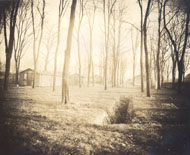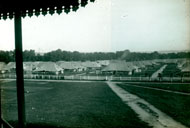In Her Words
Letter from Julia C. Stimson to her family, November 16, 1917
Rev. Henry A. Stimson, father of Base Hospital 21 chief nurse Julia C. Stimson, compiled his daughter’s letters to her family during the First World War into the book, Finding Themselves. Published in 1918 (before the end of the war), Finding Themselves tells of the experiences and gradual changes in the nurses as they “found themselves” through days and nights of unrelenting and difficult service.
As soon as the Base Hospital 21 unit arrived in Rouen in early June 1917 to take over the British No. 12 General Hospital, the British hospital staff withdrew. This left the 1,300-bed British Expeditionary Force hospital in the hands of an American medical team prepared to handle a 500-bed hospital. The first order of business after unpacking was to send for reinforcements from Washington University.
Medically trained reinforcements from Washington University arrived in Rouen, November 1917.
November 16, 1917
It has been a pretty long time since I last wrote a regular letter. It has not been because we were so terribly busy, for in the last ten days our census has come down a little and things stopped being quite as strenuous as they had been since the first of October. Sometimes, however, I find it hard to write and I put it off, thinking that I’ll be feeling more like doing it the next day. I usually love to write. These last few days, however, we have been most busy, for on the 13th at noon we had notice that our long-expected 31 nurses would arrive that afternoon. Capt. Johnston and I went down to meet them, leaving the people here scurrying around trying to get enough food to feed all those extra people and to work out the plans we made long ago, as to how we would house them until the V.A.D.’s were taken away.
The next day most of the V.A.D.’s were taken away to the different hospitals in this neighborhood, and to-day we are beginning to settle down. The details of the records that are necessary, both for the outgoing people as well as for the new-comers, have been very numerous and complicated, but Miss Taylor and I and the little stenographer have put things through in fairly rapid shape. I have yet many payrolls and traveling expense vouchers and pay allotments and lists galore to attend to, but the most immediate and important ones are finished.
We have started the new ladies all off on the wards and they seem very much interested and thrilled and glad to be here. Since it is almost three months since they left St. Louis, they are mighty glad to arrive somewhere and get started to work. Poor things, they have to go through the adjusting that we all had. They never will get used to some things, such as the awful wounds, the appalling cheeriness of the men, and the sight of the troops marching off to the front. . . .
I have been making many speeches this week. Just a little while ago I had a long talk with all my American nurses; then of course I had to have a farewell talk with the V.A.D.’s; and then all the poor new nurses had to have me tell them, not rules and regulations, for they can read those on the bulletin board, but a little about the way we all feel after six months and some of the processes we have been through, which they are pretty sure to have to go through too. It is very curious with a group of people such as I have here, how they light up and are moved when they are interpreted to themselves. It is the greatest delight to me to try to make them see themselves and what they are doing, in large terms. I try to fit the daily trials and depressions and difficulties, and the way they take them, into their right place in their sense of patriotism. . . . About two weeks ago I had to tell two nurses, for whom I had applied for discharge after six months, that it was refused. One was to go home to be married and the other to join her husband whom she married one hour before we left St. Louis. Both were so splendid about the matter, and acted as though this was the decision that they themselves would have made; I was most impressed. And that is the spirit of the whole group. Nurses say all the time, “I couldn’t be hired to go home now, knowing what I know now.” Oh, they are so fine. The new group seem so surprised to find us so happy. They also seem much surprised to find us so well off for food and general considerations. We all look more husky and rosy-cheeked and fat than they do. . . .
With loads and loads of love,
Julia
Next letter from Julia Stimson to her family (March 25, 1918)>>
Return to Letters & Memos (In Her Words)
Return to In Her Words
Back to Top


